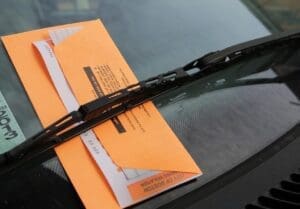 Getting a parking ticket is always a frustrating experience. Last weekend, I took my kids to this cool skate park under the Zakim Bridge, parking at North Point Park in Cambridge. We got back to the car about 2 minutes after our meter expired, only to see the parking enforcement officer driving away and a fresh ticket on the windshield. Looking at the bright side, I can now enter a contest run by Lyft for the chance to offset the fine. To enter the contest, parking offenders can take a picture of the citation and share it on social media platforms tagging @Lyft and using the hashtag #ShouldveTakenALyft. About 150 people will be chosen to receive prizes that include $100 in Lyft ride credits or Lyft Pink memberships. That could help take a little bit of the sting out of the ticket. And now on to this week’s logistics news.
Getting a parking ticket is always a frustrating experience. Last weekend, I took my kids to this cool skate park under the Zakim Bridge, parking at North Point Park in Cambridge. We got back to the car about 2 minutes after our meter expired, only to see the parking enforcement officer driving away and a fresh ticket on the windshield. Looking at the bright side, I can now enter a contest run by Lyft for the chance to offset the fine. To enter the contest, parking offenders can take a picture of the citation and share it on social media platforms tagging @Lyft and using the hashtag #ShouldveTakenALyft. About 150 people will be chosen to receive prizes that include $100 in Lyft ride credits or Lyft Pink memberships. That could help take a little bit of the sting out of the ticket. And now on to this week’s logistics news.
- Amazon shifts its autonomous delivery focus
- China port congestion worsens as ships divert away from Ningbo
- FedEx hits big shippers with 2 residential delivery surcharges
- Tight supply of truckers leaves some gas stations dry
- The Post Office launches first external ‘click & collect’ deal in 360 years with DPD
- 7-Eleven teams with Minibar to deliver even more booze to your door
- Taco Bell unveils drive-thru prototype for online orders
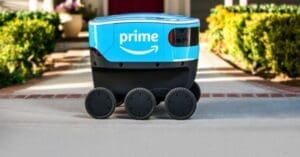 As I wrote about last week, Amazon’s drone delivery dream may be in jeopardy, as the company has shuttered part of its operations in the UK. Instead, Amazon is focusing its autonomous delivery efforts on sidewalk delivery robots. The company launched its first sidewalk delivery robot named Scout in January 2019, but the bot has not moved beyond the testing phase. Amazon is ramping up its efforts to get Scout into a neighborhood near you, with plans to open a facility in Helsinki dedicated to testing and refining Scout. Public perception of sidewalk bots has improved, especially as more companies are in the testing phase, and people are generally less weary of a robot than a drone operating autonomously. Amazon Scout has already performed well in its tests in California and Washington.
As I wrote about last week, Amazon’s drone delivery dream may be in jeopardy, as the company has shuttered part of its operations in the UK. Instead, Amazon is focusing its autonomous delivery efforts on sidewalk delivery robots. The company launched its first sidewalk delivery robot named Scout in January 2019, but the bot has not moved beyond the testing phase. Amazon is ramping up its efforts to get Scout into a neighborhood near you, with plans to open a facility in Helsinki dedicated to testing and refining Scout. Public perception of sidewalk bots has improved, especially as more companies are in the testing phase, and people are generally less weary of a robot than a drone operating autonomously. Amazon Scout has already performed well in its tests in California and Washington.
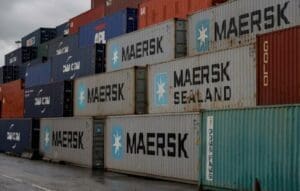 Operations at Ningbo Meishan port terminal were suspended on August 11th after a single case of COVID-19 was reported among the Ningbo Meidong Container Terminal staff. The terminal accounts for about a quarter of the port’s capacity, and it was still closed earlier this week. As ships divert away from Ningbo amid uncertainty over how long virus control measures in the city will last, other ports are facing more pressure. As of this week, 40 vessels were waiting at anchor for a berth outside Ningbo, and an additional 30 container ships were parked outside the Port of Shanghai. Port authorities had previously signaled a possible reopening date of September 6th.
Operations at Ningbo Meishan port terminal were suspended on August 11th after a single case of COVID-19 was reported among the Ningbo Meidong Container Terminal staff. The terminal accounts for about a quarter of the port’s capacity, and it was still closed earlier this week. As ships divert away from Ningbo amid uncertainty over how long virus control measures in the city will last, other ports are facing more pressure. As of this week, 40 vessels were waiting at anchor for a berth outside Ningbo, and an additional 30 container ships were parked outside the Port of Shanghai. Port authorities had previously signaled a possible reopening date of September 6th.
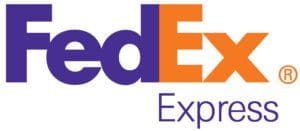 FedEx announced a series of surcharges to cover the delivery of shipments during the upcoming peak shipping season, as well as a separate 60-cents-per-package surcharge to extend into 2022. The holiday surcharge cycle, which begins October 4, includes a $5.95-per-package surcharge on shipments requiring “special handling.” A $62.50-per-piece charge will be imposed on so-called oversize shipments that don’t fit the company’s conveyable processes. A $350-per-package charge will be levied on “unauthorized” shipments that FedEx discourages because their large sizes and weights make them more appropriate for LTL shipping and handling rather than parcel. The FedEx surcharge season kicks off on November 1 with a $1.50 per-piece fee added on to all shipments delivered by the company’s Ground Economy service.
FedEx announced a series of surcharges to cover the delivery of shipments during the upcoming peak shipping season, as well as a separate 60-cents-per-package surcharge to extend into 2022. The holiday surcharge cycle, which begins October 4, includes a $5.95-per-package surcharge on shipments requiring “special handling.” A $62.50-per-piece charge will be imposed on so-called oversize shipments that don’t fit the company’s conveyable processes. A $350-per-package charge will be levied on “unauthorized” shipments that FedEx discourages because their large sizes and weights make them more appropriate for LTL shipping and handling rather than parcel. The FedEx surcharge season kicks off on November 1 with a $1.50 per-piece fee added on to all shipments delivered by the company’s Ground Economy service.
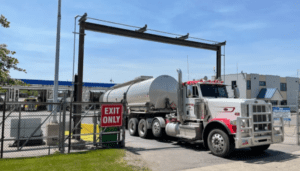 We have written about the truck driver shortage quite often and its impact on transit times and freight costs. One sector that is dealing with this now is fuel transportation. The companies that transport fuel to gas stations are scrambling to find qualified drivers to deliver every shipment. Delivering fuel to gas stations requires a specific license, and those drivers are hard to come by right now. Even without a shortage of gas in the US, because companies can’t find enough drivers in places like Colorado, Iowa, and the Pacific Northwest, a scattering of gas stations have briefly run dry. Trucking companies have been raising minimum guaranteed weekly pay in an effort to attract more drivers, but with limited success.
We have written about the truck driver shortage quite often and its impact on transit times and freight costs. One sector that is dealing with this now is fuel transportation. The companies that transport fuel to gas stations are scrambling to find qualified drivers to deliver every shipment. Delivering fuel to gas stations requires a specific license, and those drivers are hard to come by right now. Even without a shortage of gas in the US, because companies can’t find enough drivers in places like Colorado, Iowa, and the Pacific Northwest, a scattering of gas stations have briefly run dry. Trucking companies have been raising minimum guaranteed weekly pay in an effort to attract more drivers, but with limited success.
The Post Office, the UK’s largest retail network with over 11,500 branches, will launch the new click & collect initiative across 250 stores this month, expanding to 1500 branches by the end of the year. The landmark deal with DPD, a leading UK parcel company, is the company’s first partnership with an external delivery company in its 360-year history. Shoppers will now be able to choose to have their online orders delivered via DPD to their local Post Office for the first time. According to a letter sent to postmasters participating in the trial, which includes 200 branches in Edinburgh, Newcastle and Preston, customers will now be able to collect their Amazon orders at their local Post Office. Postmasters are understood to have received smartphones designed to scan Amazon packages as they arrive, allowing customers to simply present a pickup code before collecting their parcel.
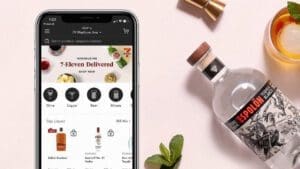 As e-commerce surged during the pandemic, alcohol sales also skyrocketed. More and more convenience stores and grocery stores launched or expanded home delivery to meet the changing customer preferences and shopping behavior. 7-Eleven was one company that moved into home delivery, and now the company is expanding its service. The company has announced a collaboration with Minibar Delivery, an independent marketplace for alcohol delivery, that will see select stores in Florida, Texas, and Virginia offer beer and wine delivery direct to customers’ homes. In addition to alcoholic beverages, the new pilot program will also allow 7-Eleven customers to order snack hits such as Slurpees, Big Bite Hot Dogs, chips, and pizza. 7-Eleven says 600 stores will take part in its alcohol delivery pilot. That includes stores in Orlando, Tampa, Fort Myers, and Miami in Florida; San Antonio, Dallas, Austin, and Fort Worth in Texas, and Virginia Beach, Richmond, Norfolk, and Alexandria in Virginia, with additional markets to come later this year. Alcoholic deliveries will, of course, be limited to those 21 years old and above.
As e-commerce surged during the pandemic, alcohol sales also skyrocketed. More and more convenience stores and grocery stores launched or expanded home delivery to meet the changing customer preferences and shopping behavior. 7-Eleven was one company that moved into home delivery, and now the company is expanding its service. The company has announced a collaboration with Minibar Delivery, an independent marketplace for alcohol delivery, that will see select stores in Florida, Texas, and Virginia offer beer and wine delivery direct to customers’ homes. In addition to alcoholic beverages, the new pilot program will also allow 7-Eleven customers to order snack hits such as Slurpees, Big Bite Hot Dogs, chips, and pizza. 7-Eleven says 600 stores will take part in its alcohol delivery pilot. That includes stores in Orlando, Tampa, Fort Myers, and Miami in Florida; San Antonio, Dallas, Austin, and Fort Worth in Texas, and Virginia Beach, Richmond, Norfolk, and Alexandria in Virginia, with additional markets to come later this year. Alcoholic deliveries will, of course, be limited to those 21 years old and above.
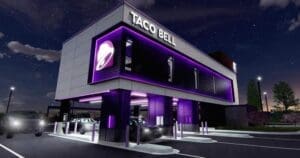 And finally, Taco Bell is looking at ways to get you the food you ordered faster than ever. A Taco Bell franchisee is building a new restaurant that the chain said will be the fastest way to get its food: a two-story, technology-heavy unit with four drive-thru lanes dubbed Taco Bell Defy. Of the four drive-thru lanes, three will be devoted to advanced orders. Customers will pull up and scan a unique QR code associated with their order. The food will descend from the kitchen above via a lift system that allows for contactless delivery. Border Foods will break ground on the prototype in the Twin Cities suburb of Brooklyn Park later this month, with plans to open to the public next summer.
And finally, Taco Bell is looking at ways to get you the food you ordered faster than ever. A Taco Bell franchisee is building a new restaurant that the chain said will be the fastest way to get its food: a two-story, technology-heavy unit with four drive-thru lanes dubbed Taco Bell Defy. Of the four drive-thru lanes, three will be devoted to advanced orders. Customers will pull up and scan a unique QR code associated with their order. The food will descend from the kitchen above via a lift system that allows for contactless delivery. Border Foods will break ground on the prototype in the Twin Cities suburb of Brooklyn Park later this month, with plans to open to the public next summer.
That’s all for this week. Enjoy the weekend and the song of the week, the Beatles’ Lovely Rita.

















